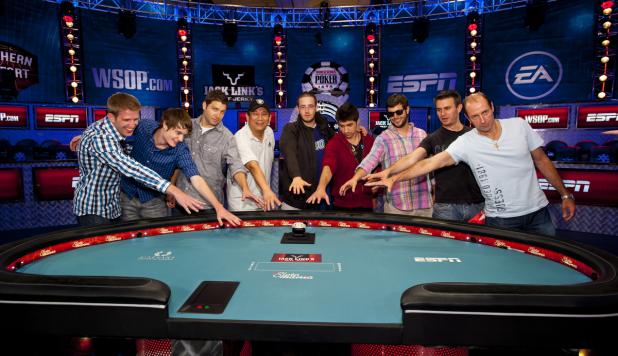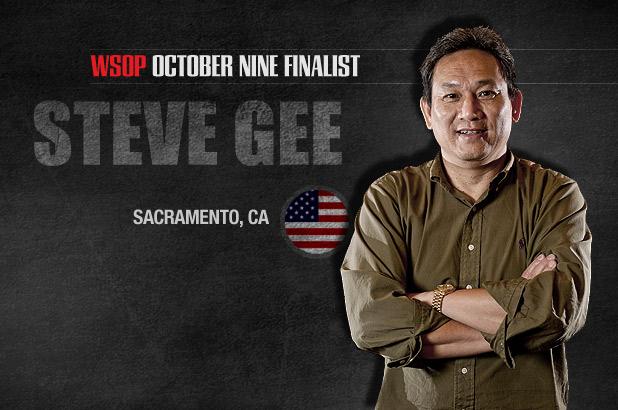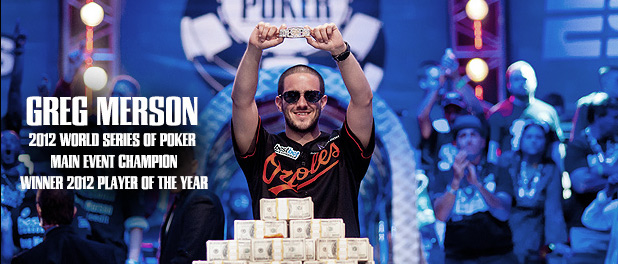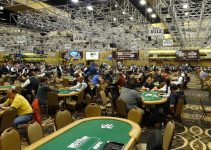With four different winners, in four different competitions, it didn’t occur to us that the WSOP 2012 tournament could get any crazier, or more inconsistent, ahead of the final competition that was scheduled to take place at the famous Penn & Teller Theatre, Rio All-Suite Hotel & Casino in Las Vegas, Nevada.
Oh, how wrong were most of the people, including us. Some of the favourites didn’t even make it to the final table, with the least expected player being the one who carried the day!
WSOP 2012 – A Quick Summary
Dates: July 7, 2012, through October 31, 2012
Location: The Penn and Teller Theatre, at the Rio All-Suite Hotel and Casino in Las Vegas, Nevada
Total Number of participants: 6,598
Buy-In: $10,000
Total Net Prize Pool: $62,031,385
Top Prize: $8,531,853
WSOP 2012 Final Facts – Schedule & Participants
The event kicked off on Monday, October 29 at 8:00 p.m ET, live on ESPN2. The field was played until there were only three players remaining. The event would then proceed on Tuesday until the winner was determined.
On Tuesday, October 20 at 9:00 pm ET, the event kicked off at the Penn and Teller Theatre whith Norman Chad and Lon McEachern commentating. At the start of the event, there were 9 players, who included the following.

2012 WSOP October Nine
| Name | Age | Country | Table Seat | WSOP Bracelets | Chips | First Preflop Raise | Preflop Reraises |
| Russel Thomas | 24 | USA | 1 | 0 | 24,800,000 | 25 | 2 |
| Jacob Balsiger | 21 | USA | 2 | 0 | 13,115,000 | 59 | 29 |
| Jeremy Ausmus | 32 | USA | 3 | 9,805,000 | 19 | 4 | |
| Steven Gee | 56 | USA | 4 | 1 | 16,860,000 | 4 | 0 |
| Greg Merson | 29 | USA | 5 | 1 | 28,725,000 | 67 | 27 |
| Jesse Sylvia | 31 | USA | 6 | 0 | 43,875,000 | 73 | 26 |
| Robert Salaburu | 32 | USA | 7 | 0 | 15,555,000 | 8 | 2 |
| Andras Koroknai | 30 | Hungary | 8 | 0 | 29,375,000 | 10 | 8 |
| Michael Esposito | 44 | USA | 9 | 0 | 16,260,000 | 5 | 3 |
One of the listed nine players had the hopes of winning the £8,527,982 top prize in addition to the coveted WSOP golden bracelet. Without any ‘top gun’ to cause a cause a stir in the final match, it was really difficult for fans and spectators to predict the final winner.
The leader had to make the chips count
The competition started as scheduled, with the 26-year-old Jesse Sylvia sitting as the chip leader with a total of 43,875,000. This was an impressive 14,500,000 chip advantage over second placed Andras Koroknai, which automatically made him the favourite before the action started unfolding.
However, despite being the chip leader, there was no guarantee that he was going to win the title after the second day.
Since the WSOP 2002 event, there have only been four occasions out of 10 that the chip leader going to the final event won the WSOP golden bracelet. The latest achievement was Jonathan Duhamel, who won it in 2010, and before that, there hadn’t been a chip leader winning at the final event since 2006.
On average, winners from the past WSOP events have held the third highest stack going into the final table, but no one has ever won the final event, with the average value strongly indicating that the chip leader had chances of prevailing.
Did age play a huge role in determining the winner?
Interestingly, a new trend had been noticed since the 2008 WSOP competition, where the last four winners were between the age of 21 and 23. In the past six years prior the 2008 WSOP, the youngest player to have won the competition was 26-year-old amateur Chris Moneymaker.
The last four winners before the WSOP 2012 have been between 21 and 23 years
The emerging trend of youthful winners can be attributed to the growing influence of the online poker over the last decade, which has produced a youthful dominance at the event.
At the WSOP 2012 final table, only one player was under the age of 23, Jacob Balsiger, with four other players aged between 24 – 27 years. If he, Jacob Balsiger, were to prevail, he would have been the youngest player to ever win the competition.
At the other end of the spectrum, there was Steven Gee, who was the oldest player on the table and would’ve been be chasing the golden bracelet in addition to being the oldest player to win the competition in the past 15 years.

Steven Gee: WSOP 2012 Finalist
Lack of big guns meant the WSOP 2012 table was open to any player
The lack of a ‘big gun’ was a notable feature at the WSOP 2012, and nothing highlighted that fact more than Phil Hellmuth’s record as compared to that of the 2012 WSOP final table.
In poker history, Phil Hellmuth is considered as the most successful player, having won 13 WSOP bracelets, $12,189,531 in prize money, as well as a record of 95 cashes. When you compare his record against the WSOP 2012 final table, there are only 2 WSOP bracelets, a cumulative of $2,082,327 in prize money, and a total of 33 cashes.
Greg Merson, a 24-year-old professional poker player, was the favourite candidate to win the event. For half a decade, the player has been dominating the online poker scene, up until a year to the WSOP 2012 event when he switched to live play in preparation for the event. As a live player, he managed to enter seven events; cashing out five times, making it to the finals on two separate occasions and winning one event.
Odds Suggested an American Winner
With a total of eight Americans and one European, the 2012 WSOP looked like a United States final, which was crushed by Andras Koroknai, a Hungarian poker player. Prior to the event, he admittedly said he’d been practising English for the event. At 30 years old, the only dominant competition that he’s won is the World Poker Tour 2010 L.A. Poker Classic, and with that, he had the backing of a large group of vocal supporters.

America vs Hungary Final
According to past WSOP finals, Americans have dominated with only 8 non-Americans winning the event in 42 events. This represents only 19% out of the possible 100%.
And the winner of the 2012 WSOP was…
There’s no written strategy that could have made winning the $$8,531,853, top prize a walk in the park, and neither was there any person who’d said that winning this amount of money would be easy.
And this was certainly the case for the 24-year-old Greg Merson, who staged one of poker’s greatest comeback in recent history to win the golden bracelet for the 2012 WSOP. It’s dubbed as one of the greatest comebacks because, at one point, he was down to a mere 50,000 chips. He, however, battled, his way back into the competition slowly and resiliently, using a unique strategy.

24-Year-Old Poker Pro Greg Merson Wins the WSOP 2012 Event
Using his ability to play shorthanded, he’d improved his standing all the way to the second position by the time he was reaching the final table, gaining 28,725,000 chips in the process. This was a very comfortable position, which allowed him to continue employing the skills he’d earned online, although in a totally different fashion. How? He avoided crippling bad bets, a factor that enabled him to move into the final three with much ease!
From that point, all he had to do was outlast amateur Jake Balsiger and Jesse Sylvia in a 12-hour marathon, which started on Tuesday night and lasted well into Wednesday morning before being claimed as the WSOP 2012 winner.


